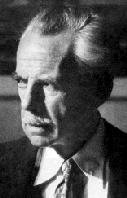|
 Born October 16,
1888 in a hotel then situated at Broadway and Forty-third Street
in New York City, Eugene O'Neill was the son of James O'Neill,
one of America's most popular actors from the 1880s until World
War I. The first seven years of Eugene's life were spent travelling
the country with his father who had given up his career as a
shakespearean actor to tour in a less satisfying but highly profitable
play called Monte Cristo. Eugene's violent reaction to
everything conventional in the theatre may have been related
to his intimate association with this play. Born October 16,
1888 in a hotel then situated at Broadway and Forty-third Street
in New York City, Eugene O'Neill was the son of James O'Neill,
one of America's most popular actors from the 1880s until World
War I. The first seven years of Eugene's life were spent travelling
the country with his father who had given up his career as a
shakespearean actor to tour in a less satisfying but highly profitable
play called Monte Cristo. Eugene's violent reaction to
everything conventional in the theatre may have been related
to his intimate association with this play.
O'Neill spent six years in a Catholic boarding school and
three years in the Betts Academy at Stamford, Connecticut. He
attended Princeton for a short time, but when he was suspended
at the end of his freshman year, he decided not to return. In
1909, he set out on a gold-prospecting voyage to Honduras--only
to be sent home six months later with a tropical fever. During
the period that followed, he spent time working as a stage manager,
an actor, a tramp, and a reporter. He also tended mules on a
cattle steamer and set out on several other voyages as a sailor.
It was here that he came in contact with the sailors, dock workers
and outcasts that would populate his plays, the kind of characters
the American theatre had heretofore passed over in silence. But
this irregular life took its toll on the young man, and in December
1912, he was forced to retire for six months to a sanatorium
for tubercular patients. It was during this time that O'Neill
began to read not only the classic dramatists, but also Ibsen,
Wedekind and Strindberg--"especially
Strindberg" he would later confess. He then turned his hand
to playwriting, quickly churning out eleven one-act plays and
two full-lengths, not to mention a bit of poetry.
Then, in 1916, O'Neill met at Provincetown, Massachusetts,
the group which was founding the Provincetown Players, including
Susan Glaspell and Robert Edmond Jones. Shortly thereafter, the
group produced O'Neill's one-act play Bound East for Cardiff
in Mary Heaton Vorse's Wharf Theatre at Provincetown. Other short
pieces followed at the playhouse on MacDougal Street, and soon
O'Neill's plays became the mainstay of this experimental group.
It was a marriage made in Heaven. O'Neill got a theatre company
which would produce his plays, and the company got a playwright
who would--more than any other single author--provide it with
the fuel to revolutionize the American Theatre.
With the Broadway production of Beyond the Horizon
in 1920, O'Neill began a steady rise to fame. He received countless
productions both in the United States and abroad, and when the
Provincetown players finally collapsed, he became the Theatre
Guild's leading playwright. But by the time he received the Nobel
Prize in 1936--a feat which no other American playwright had
been able to accomplish--his career had begun to fizzle. The
new generation of critics--Francis Fergusson, Lionel Trilling,
Eric Bentley--began to subject O'Neill to a closer scrutiny than
their predecessors who had been satisfied simply to find an American
playwright of international stature. Pushed about by this critical
storm, obscurity began to settle in on the playwright, and it
deepened more and more until his death in 1953. Ironically, it
was during these dark years that O'Neill's real development began.
Maturing in silence and motivated only by his obsessive urge
to write, he developed a profound artistic honesty which would
result in several genuine masterpieces of the modern theatre
including A Touch of the Poet (1935-1942), More Stately
Mansions (1935-1941), The Iceman Cometh (1939), A
Long Day's Journey into Night (1939-41) and A Moon for
the Misbegotten (1943). Most of these were not published
or produced during O'Neill's lifetime.
Then, in 1956, three years after the playwright's death, a
successful revival of The Iceman Cometh and the first
Broadway production of A Long Day's Journey into Night,
returned Eugene O'Neill once again to his rightful place at the
forefront of American Drama. As George Jean Nathan noted, O'Neill
"singlehandedly waded through the dismal swamplands of American
drama, bleak, squashy, and oozing sticky goo, and alone and singlehanded
bore out the water lily that no American had found there before
him." Today, he is recognized not only as the first great
American dramatist, but as one of the great dramatists of all
time.
|